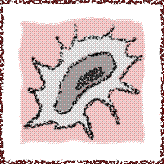Prev: diabetes
Next: lung disease

How our cells turn dangerous
(Avoiding cancers)
To keep your body working at its best, it has a
sort of ‘planned maintenance’ so that older cells die off and are
replaced before they wear out and cause problems. Every second of your
life, millions of your cells die in an ordered way and new ones take
their place. You are probably aware of this happening in your skin, but
the same process happens to virtually every other cell too.
Very occasionally a single cell can be altered –
perhaps by chemicals, infections, radiation or even sunlight – so that
it won’t die when it is supposed to. When this cell forms new cells,
they too won’t die. Nor will the cells they create... nor the ones these
create in their turn. This is essentially what cancer is.
How cancer develops
At first the cancer may be localised to a few cells,
and sometimes it never spreads beyond this stage. But sometimes the
number of cells just keeps doubling. Even if your body’s defences manage
to kill a few of these cells, it’s not too long before there’s a
sizeable cancer. It’s made worse by any local inflammation, and even by
your body unwittingly creating new blood vessels that feed the cancer.
If a cancer is detected early when it’s still in one place, there’s a good chance it can be removed.
But once it gets
larger and starts to invade the surrounding area and gets into the blood
and lymph vessels it spreads widely and can cause damage around the
body. Unfortunately, cancers often don’t cause symptoms until they are
big enough to press on nearby structures, or have spread to critical
parts of the body.
Some of the things you can do
Tobacco smoke is particularly bad. The
cancer-causing chemicals it contains are carried around the whole body.
Smokers suffer higher levels of all types of cancer.
Follow safety instructions to avoid contact with
harmful substances and chemicals.
Cover up in strong sunlight, and use sunscreen.
Try to avoid radiation, such as unnecessary
x-rays.
Girls should be immunised against HPV, a virus
that can cause cervical cancer.
Keep physically active. This seems to protect
against cancer in general.
It’s vital that cancer is detected early. If you
experience unexplained symptoms, see a doctor. There are screening
programmes available for some people, e.g. for breast cancer.
What the book covers
As well as explaining cancer in more depth, the
book lists steps to take so you are less likely to get any form of
cancer.
It then discusses each of the main types of cancer – lung cancer, breast cancer, skin cancer etc – in turn, suggesting
steps to avoid them
how likely you are to get them
what warning signs to look out for
what screening is available
what the treatment would be.
Prev: diabetes
Next: lung disease
Selected references for the book

